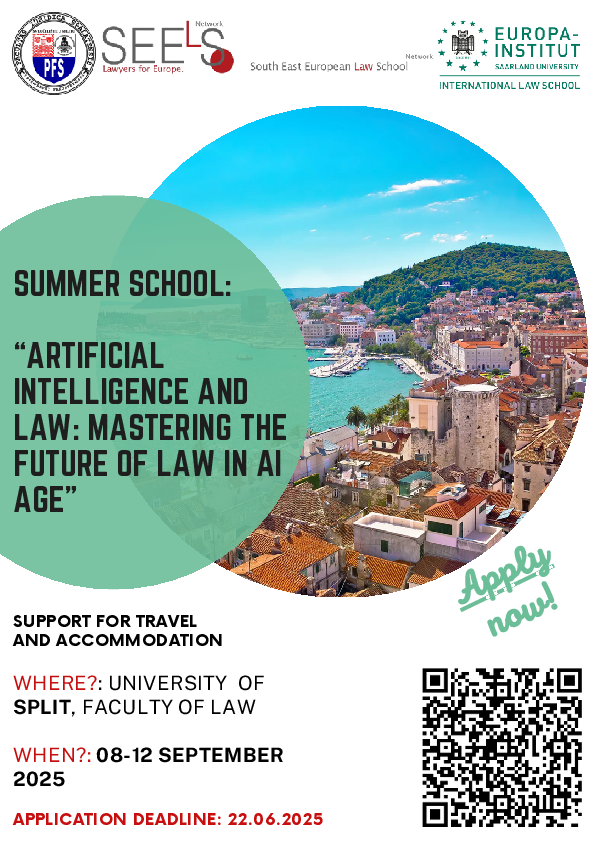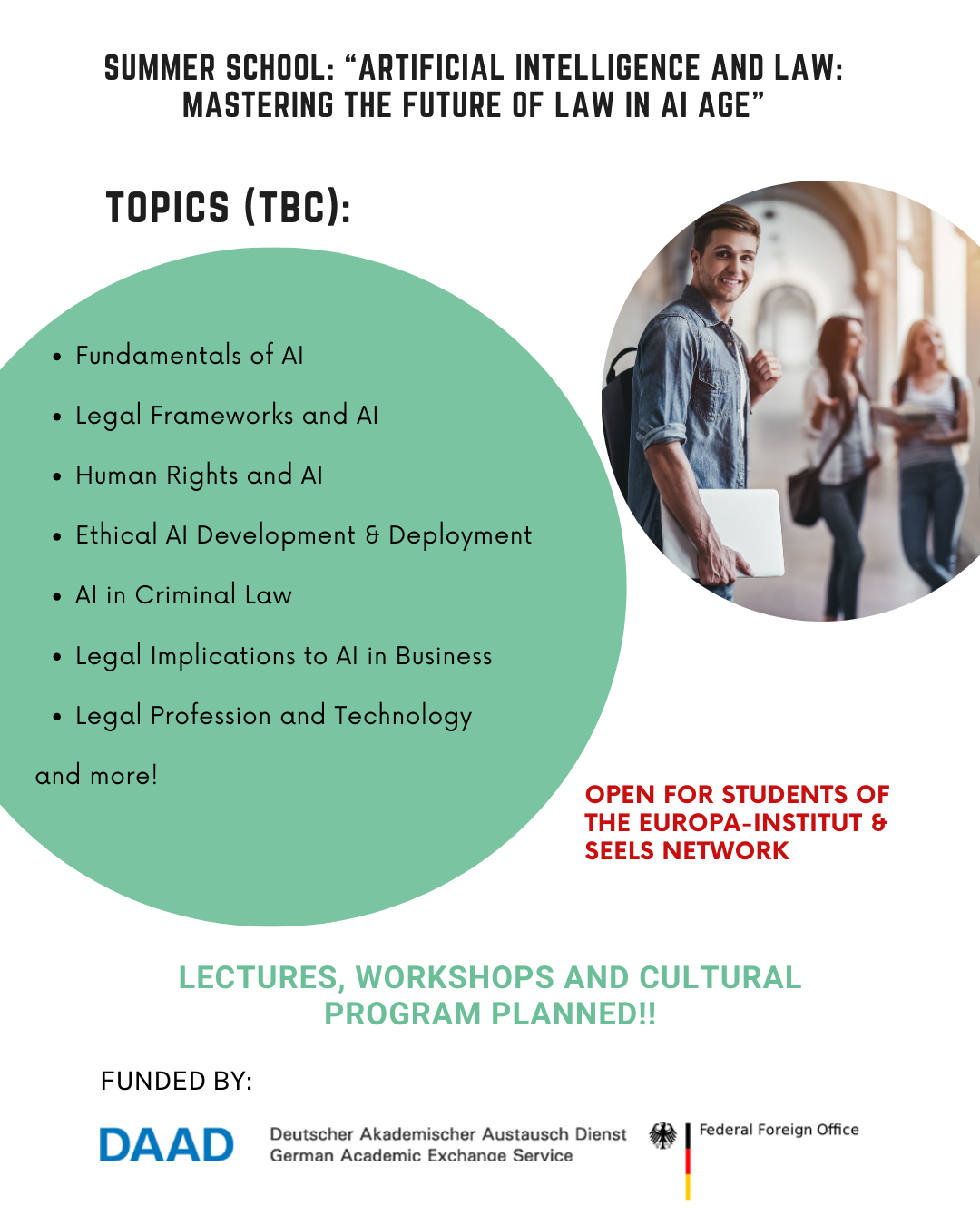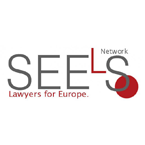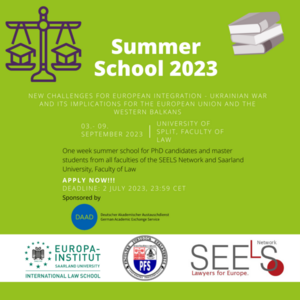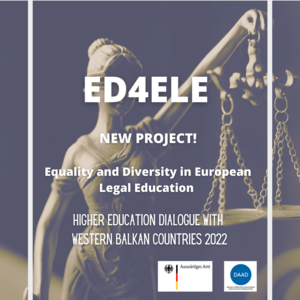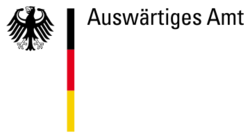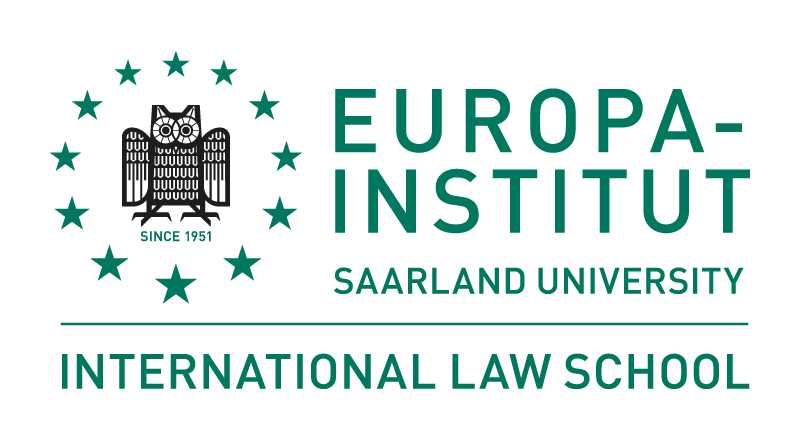
The DAAD Higher Education Dialogue aims to promote cooperation and exchange between universities in the target region and to strengthen the ties between the target countries and the EU. The European perspective for the Western Balkan states is important for the preservation of peace and the stabilization of this region.
DAAD Higher Education Dialogue with the countries of the Western Balkans is a funding program financed by the German Academic Exchange Service (DAAD) and the German Federal Foreign Office. This programme has been organized every year since 2013 by the Europa-Institut in cooperation with the South East European Law School Network (SEELS) and the partner faculties from Albania (Tirana), Bosnia and Herzegovina (Sarajevo and Zenica), Croatia (Osijek, Rijeka, Split, Zagreb), North Macedonia (Skopje) and Serbia (Belgrade and Nis).
The aim of the DAAD Higher Education Dialogue is to establish a network of lawyers in teaching and research in the field of European and international law. Each year, the consortium sets new thematic priorities and, in addition to workshops and training for teaching staff, organizes an annual summer school in the countries of the Western Balkans for students of the partner faculties.
- 2024 ELEC Preparing for EU Accession - Hochschuldialog 2024 (Belgrad - Serbien)
- 2023 "New Challenges for European Integration - Ukrainian War and its implications for the European Union and the Western Balkans" - Hochschuldialog 2023 (Kroatien - Split)
- 2022 ED4ELE - (Equality and Diversity in European Legal Education) - Ost-West-Dialog: Hochschuldialog mit den Ländern des westlichen Balkans 2022 (Kroatien - Split)
- 2020 Rule of law: Arbitration as an opportunity for peaceful dispute settlement (Kroatien – Zagreb) aufgrund der Covid-19- Pandemie ONLINE
- 2019 #FreeMedia4WesternBalkans (Kroatien – Split)
- 2018 Access2Justice4All (Serbien – Belgrad)
- 2017 Protection of Ethnic Minorities (Albanien – Durrës)
- 2016 Challenges of Migration and Asylum – Legal Aspects (Nordmazedonien – Ohrid)
- 2015 EU Open Markets (Kroatien – Zagreb & Split)
- 2014 Essentials of European Law (Kroatien – Zagreb & Rijeka)
- 2013 Summer Academy SEE Graduates EU Law Teaching & Research Academy (Saarbrücken)
In den vergangenen Jahren konnten so beinahe 200 Studierende und Doktorandinnen und Doktoranden aus Saarbrücken und den Partnerländern sowie viele Professorinnen und Professoren und Expertinnen und Experten aus Deutschland und den Ländern Südosteuropas gefördert werden und an den Projekten teilnehmen.
Das Europa-Institut zusammen mit dem South East European Law School Network und den Partnerfakultäten bemühen sich weiterhin, auch in den nächsten Jahren interessante und aktuelle Projekte zu organisieren, so dass Teilnehmerinnen und Teilnehmer ihre Kenntnisse im Bereich des Europarechts und des Internationalen Rechts vertiefen und durch den Austausch ein Netzwerk mit Kolleginnen und Kollegen aus anderen Ländern aufbauen können.
HARTech: Human Rights and Technology: Bridging the Gap with AI Applications - Higher education dialogue 2025
Summer School: "Artificial Intelligence and Law: Mastering the Future of Law in AI Age"
Within the project "Human Rights and Technology: Bridging the Gap with AI Applications (HARTech)" funded by the DAAD (German Higher Education Exchange Service) and implemented by the Europa-Institut, University of Saarland (Germany), and the Faculties of Law, members of the SEELS Network, a summer school on AI and law is organised as part of a global classroom. The summer school "AI and Law: Mastering the Future of Law in AI Age” aims to provide the students with an intensive learning experience and give them a comprehensive understanding of key aspects related to Law and new technologies with special focus on artificial intelligence (AI). The Summer School is based on a multidisciplinary program designed to explore the intersection of technology, ethics, and legal studies. Participants will gain a solid foundation in the fundamentals of AI, while exploring its legal frameworks and implications in diverse areas such as human rights, business law, criminal law etc. The curriculum emphasizes ethical AI development and deployment, equipping students to address pressing challenges in the digital age. With sessions on AI-enhanced academic and legal research, alongside discussions on how AI is reshaping the legal profession and education, this program offers insights into the future of law in an AI-driven world.
The Summer School will take place from 08. to 12. September 2025 at the Faculty of Law of the University of Split. The 07. and 13. September are forseen as Arrival and Departure days. The project is financially supported by the DAAD and the Federal Foreign Office of Germany. There are no course fees. Accomodation and travel costs will be provided as an in-kind-scholarship.
Application process:
Please note that the application process consists of two steps:
- Fill out the digital application form
- Send the following documents via email to projects@europainstitut.de :
Curriculum Vitae
Academic transcripts/certificates
Language certificate (not required if you have studied in English or have lived in an English-speaking country for a longer period of time (at least 6 months))
Proof of enrollment
Scan of the first page of your passport/ID card
Proof of health insurance (after successful application!)
The email should have the subject Summer School "Artificial Intelligence and Law" I Application-Last Name, First Name.
The application deadline is June 22, 2025 at 23:59 (CET).
All other important information about the application can be found in the following documents:
ELEC: Preparing for EU Accession - Higher Education Dialogue 2024
BOOT CAMP "Students, EU enlargement policy and EU integration - the good, the bad, and the active"
From September 18 to 21, 2024, the boot camp “Students, EU Enlargement Policy and EU Integration - The Good, The Bad, and the Active” took place in Belgrade, Serbia. 23 students from universities that are part of the SEELS network (University of Zagreb, University of Zenicas, University of Tirana, University of Belgrade, University of Nis, University of Split, University of Rijeka, Josip Juraj Strossmayer Universitxy of Osijek, Ss. Cyril and Methodius University of Skopje, University of Montenegro, University of Sarajevo) and from Saarland University met in the lecture halls of the Faculty of Law of the University of Belgrade to attend lectures on the EU, its functions, EU enlargement including the perspectives of the Western Balkans and human rights. Digital research skills and youth in action were also covered. The program was held in English and covered the following main topics: The EU and its Functions, Human Rights in the EU Legal System, EU Single Market Law, Free Movement of Students, EU Enlargement Policy, EU Integration, Youth Policy in the EU, Youth in Action. The bootcamp included interactive workshops to develop students' skills and understanding of how to use EU law and policy digital resources, project development and implementation, study visits and cultural events. As part of the bootcamp, students had the opportunity to interact and learn from each other and the lecturers while getting to know the city of Belgrade and Serbian culture. After four intense days of lectures and sightseeing, the bootcamp ended with a farewell dinner at a popular local restaurant on the Sava River.
Deadline for application was 2 August 2024.
Summer School "New Challenges for European Integration - Ukrainian War and its implications for the European Union and the Western Balkans"
The Summer School will take place from September 3 to 9, 2023 at the Faculty of Law of the University of Split (on September 3 and 9, a half-day program is planned - on the day of arrival in the afternoon / on the day of departure in the morning - the rest of these days are planned for arrival and departure). The Summer School is organized in the framework of the project “New Challenges for European Integration - Ukrainian War and its implications for the European Union and the Western Balkans” of the SEELS network faculties and the Europa-Institut of Saarland University (Germany), which is financially supported by the DAAD and the Federal Foreign Office of Germany.
The summer school is aiming to introduce students and young academics to the new challenges for European Integration due to the Russo-Ukrainian War and its implications for the European Union and the Western Balkans. A special emphasis will be put on the EU accession process and the EU neighbourhood policy. The participants should be made more aware of the topic and enabled to recognise deficiencies and defuse situations through knowledge of the legal framework, and in particular to understand the complexity of the EU accession process. Moreover, interactive trainings and workshop sessions should foster the discussion among the participants.
The program will be delivered in English with a selection of the following topics (preliminary list, changes will be possible): Russo-Ukrainian war, development, history and reasons; International Public Law in the times of war; Refugees from Ukraine in Europe; Fighting War Crimes with International Criminal Law; Reactions of the European Union – Supporting Ukraine, Sanctioning Russia; EU Enlargement Policy: Who´s next?; A new strategy for the EU Neighborhood Policy; NATO or European Union: Developing an European Security strategy; Mobility of people and goods: Food and worker markets; How to secure the energy supply; We waited longer: conditionality and fairness in the accession process; New models for European Integration.
Please note: The application deadline for this year's Summer School was 2 July 2023.
Dr. Mareike Fröhlich, LL.M.
Project coordination
Phone: +49 (0)681/302-3653
E-mail: projects(at)europainstitut.de
ED4ELE (Equality and Diversity in European Legal Education)
Higher Education Dialogue with the countries of the Western Balkans 2022
In the summer of 2022, under the direction of Prof. Dr. Thomas Giegerich LL.M. (Co-Director of the Europa-Institut and holder of the Chair of European Law, Public International Law and Public Law), the Europa-Institut at Saarland University held a university dialog with the countries of the Western Balkans. The project entitled “ED4ELE” (Equality and Diversity in European Legal Education) aimed to identify similarities and differences in the legal and institutional areas of law studies in the partner countries in the project Albania, Bosnia and Herzegovina, Croatia, North Macedonia, Montenegro, Serbia and Slovenia. The project was funded by the German Academic Exchange Service (DAAD) with funds from the Federal Foreign Office (AA) as part of the “Higher Education Dialogue with the Countries of the Western Balkans” program, with funding amounting to almost 40,000 euros. The main aim of the project was to expand the existing networks between the Europa-Institut and the partner countries to include the topic of equality and diversity in legal education. In this context, a summer school with 25 young academics was successfully organized from 4 to 10 September 2022 in Split, Croatia, in order to facilitate cross-border exchange and networking between law faculties in the Western Balkans region as well as between German and foreign universities, students and young academics
As part of the SEE|EU Cluster of Excellence in European and International Law, a summer school on the topic of “Equality and Diversity” is planned, which will facilitate cross-border exchange and networking between law faculties in the Western Balkans region as well as between German and foreign universities, students and young academics. The project thus contributes to the sustainable development of academic teaching and research as well as the promotion of young talent. It contributes to the strengthening of civil society, the development of democracy and the reduction of ethnic conflicts in the target region. It not only enables academic exchange, but also the possibility of professional cooperation on current socio-political issues.
The project also aims to promote equal treatment and diversity in law studies. This includes not only teaching itself, but also administrative procedures, student representation and the entire study environment. Furthermore, equality and diversity should be guiding principles for cooperation between academics, especially in the context of junior academics.
Country reports on equality and diversity in higher education as a result of the round table in Belgrade can be found here.

